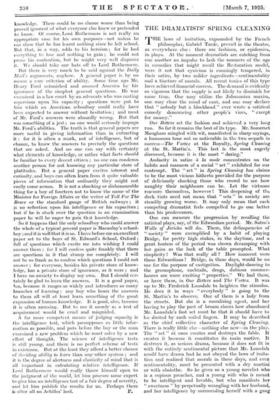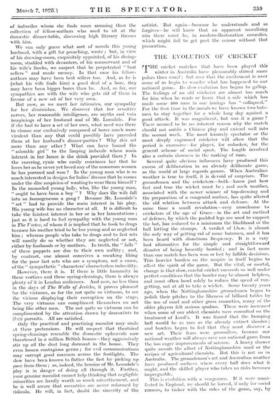THE DRAMATISTS' SPRING CLEANING.
THE laws of imitation, expounded by the French philosopher, Gabriel Tarde, prevail in the.the.atre, as everywhere else : there are fashions, or epidemics, in plays. At the moment dramatists are catching from one another an impulse to lash the manners of the age in comedies that might recall the Restoration model, were it not that cynicism is cunningly tempered, in their satire, by two milder ingredients—sentimentality and a tincture of morals. All recent tonics of this type have achieved financial success. The demand is evidently so vigorous that the supply is not likely. to diminish for some time. One may utilize the Johnsonian maxim, one may clear the mind of cant, and one may declare that " nobody but a blockhead " ever wrote a satirical comedy. denouncing other people's vices, " except for money."
Our Betters. set. the fashion and achieved a very long run. So:far it remains the best of its type. Mr. Somerset Maugham mingled with wit, manifested in sharp sayings, a humorous tone not so noticeable in the two sequels in • success—The Vortex at the Royalty, Spring . Cleaning at the St. Martin's. This last is the most eagerly discussed, because it is . the most- " daring."
Audacity in satire. a .la mode .concentrates on the habits and manners of a social " set " exhibited.for out contempt. The " set " in. Spring .Cleaning has . claims to be the most vicious hitherto. provided for the purpose of deliciously shocking those who crowd to see how naughty their neighbours can be. Let the virtuous reassure. themselves, however ! This. deepening of this dark :tints need not mean . that " sets ." in society are. steadily growing worse.. It. may only mean. that each • competing dramatist feels compelled to. go one better than his predecessors.
One can measure the progression by recalling the satirical plays, say, .of the Edwardian period. Mr. Sutro's Walls . of .Jericho will do. There,. the delinquencies of " society " were exemplified by a habit of playing Bridge, for pretty high stakes, in the daytime, and a great hostess of the period was shown decamping with her gains as the luck of the table prompted. What simplicity ! Was that really all ? How innocent were those Edwardian ! Bridge, in these days, would be. no use for the purpose of castigation. Daylight-dancing to the gramophone, cocktails, drugs, dubious summer- houses are more exciting " properties." We had them, or have them, in. Our Betters and The Vortex. It was up to Mr. Frederick Lonsdale to heighten the stimulus. He does it in ways " everybody " is going to the St. Martin's to observe. One of them is a lady from the streets. But she is a moralizing agent, and her having to play the part of broom shows how abandoned Mr. Lonsdale's fast set must be. that it should have to b e dusted by such soiled fingers. It may be described as the chief collective character. of Spring Cleaning. There is really little else—nothing else new—in the play. The " set " at once creates and destroys the fable. It creates it because it constitutes its main motive. It destroys it, as serious drama, because it does not fit in with the entirely sentimental picture that Mr. Lonsdale would have drawn had he not obeyed the laws of imita, tion and realized that morals in these days, and even sentimentality, must be presented with a dry martini or with absinthe. So he gives us a young novelist who is a copious preacher, and a young wife who is meant to be intelligent and lovable,. but who manifests her " sweetness " by perpetually wrangling with her husband,. and her intelligence by surrounding herself with a gang of imbeciles whom she finds more amusing than the collection of fellow-authors who used to sit at the domestic dinner-table, discussing high literary themes with him.
We can only guess what sort of novels this young husband, with a gift for preaching, wrote ; but, in view of his drawing-room, exquisitely appointed, of his dining- room, studded with decanters, of his manservant and of his wife's frocks, we suspect that he perpetrated " best sellers " and made money. In that case his fellow- authors may have been best sellers too. And, as he - is (what his wife finds him) a good deal of a bore, they may have been bigger bores than he. And, so far, our sympathies are with the wife who gets rid of them in favour of a new set of her very own.
But now, as we meet her .intimates, our sympathy for her diminishes. We discover that her sensitive nerves, her reasonable intelligence, are myths and vain imaginings of her husband and of Mr. Lonsdale. For if she had to have a set of her own, what need was there to choose one exclusively composed of bores much more virulent than any that could possibly have preceded them at her husband's dinner-parties ? Why this set more than any other ? What can have bound the " adorable girl " to the limping imbecile . whose main interest in her.house is the drink provided , there the sneering, cynic who easily convinces her that he loves her as he never yet loved any of the numerous women he has pursued and won ? In the young man who is so much interested in designs for ladies' dresses that he comes under the dire suspicion of wanting to wear them 'himself ? In the monocled young lady, who, like the young man, " ought to have been a boy " 2 Why does the wife fall into So_homogeneous a gang ? Because -Mr. ,Lonsdale's " set " had to provide the -main interest in his play. His young wife has -no character at all. It is difficult to take the faintest interest- in her or in her lamentations ; just as it is hard to feel. sympathy -with the young man in The Vortex, of whom it is implied that he took to drugs because his mother tried to be too young and so neglected him ; whereas people who take to drugs and to fast sets will mostly do so whether they are neglected or not, either by husbands or by mothers. In truth, the " falls " of these puppets are due to their own nullity ; and, by contrast, one almost conceives a sneaking liking for the poor fast sets who are a symptom, not a cause, of the " sympathetic " characters' characterless imbecility.
However, there it is. If there is little humanity in these vortices and these spring-cleanings, there is always plenty of it in London audiences. And now, no less than in the days of The Walls of Jericho, it proves pleasant for the virtuous, as for the not quite so virtuous, to see the vicious displaying their corruption on the stage. The- very virtuous can compliment themselves on not being like other men. The not quite so virtuous can be complimented by the attention drawn by dramatists to their pursuits. All are satisfied.
Only the practical and practising moralist- may -smile at these pretensions. -He will suspect that theatrical spring-cleanings resemble the domestic upheavals now threatened in a million British homes—they aggressively stir up all the dust long dormant in the house. They even loosen - contagious germs ; for evil communications may corrupt good manners across the footlights. The slow have been known to flatter the fast by. picking. -up pace-from them ; as, indeed, the heroine of Mr. Lonsdale's play is in danger of doing all through it. Further, your genuine moralist cannot help thinking that negligible minorities are hardly worth so much advertisement, and he is well aware that eccentrics are never reformed by ridicule. He will, in fact, doubt the sincerity of the satirist. - But again—because he understands and so forgives—he will. know that an apparent moralizing aim there must be, in modern-Restoration comedies, which might fail to get past the censor without that precaut ion.



























































 Previous page
Previous page